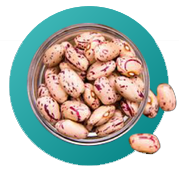Weight Loss
Reach a Healthy Weight With a Plant-Based Diet
Whether you want to lose weight, maintain a healthy weight, or just feel better, a plant-based diet can help you achieve your goals.
The Science
Plant-based diets encourage healthful weight control in two ways. First, because foods from plant sources are generally high in fiber and low in fat, they have low energy density (fewer calories per gram of food). Second, low-fat vegan diets increase after-meal energy expenditure—an increased calorie “burn” after meals.1
People who avoid meat have healthier body weights. In the Oxford cohort of the European Prospective Investigation to Cancer and Nutrition (EPIC), the mean BMI among meat-eaters was 24.4 kg/m2 for men and 23.5 kg/m2 for women; among those avoiding animal products, the corresponding figures were 22.5 kg/m2 for men and 22.0 kg/m2 for women.2 In a U.S. cohort, the differences were more striking. In the Adventist Health Study-2, including 60,903 men and women 30 years of age and older, the mean BMI among meat-eaters was 28.8 kg/m2, compared with 23.6 kg/m2 for those avoiding meat, dairy products, and eggs.3 Similarly, clinical trials with overweight individuals have shown that plant-based foods predictably result in weight loss.4
A Physicians Committee study tested a plant-based diet in a group of 64 women. At the start of the study, all the women were moderately or severely overweight.5 Participants followed two simple rules: They eliminated all animal products and kept oils to a minimum. They lost 13 pounds, on average, in 14 weeks, without calorie counting or exercise. A year later, they’d maintained an 11-pound weight loss. After two years, they were still below their original weight.6
A 2020 systemic review notes that a plant-based diet promotes significant weight loss with those following a plant-based diet noticing the most weight loss compared with omnivorous groups.7
According to a study from 2022 in Obesity Science & Practice, researchers with the Physicians Committee found that eating a plant-based diet reduces inflammatory dietary advanced glycation end-products (AGEs) by 79%, compared with a 15% reduction for a diet that includes meat and dairy products.8 AGEs are compounds that are formed in the bloodstream when proteins or fats combine with glucose and cause inflammation and oxidative stress, which eventually contribute to weight gain and chronic diseases, including type 2 diabetes and cardiovascular disease. Animal products are generally higher in AGEs than plant foods.
Plant-Based Diet Guidelines for Weight Loss
Plant-based diets can help you lose weight and keep it off because they are packed with fiber, which helps fill you up, without adding extra calories. Aim for 40 grams of fiber a day, which is easy to do when you move vegetables, fruits, whole grains, and beans to the center of your plate. Focus on the power plate, which is made up of grains, legumes, vegetables, and fruit, to meet your nutritional needs and weight loss goal.
Consuming whole grains is associated with a lower risk of elevated BMI and central obesity.9,10 Include whole grains with each meal, such as whole-wheat or sprouted bread, whole-wheat pasta, oatmeal, corn, polenta, millet, quinoa, brown rice, barley, bulgar, buckwheat, and whole-wheat or corn tortillas. Always choose the whole-grain version of any starches like rice, pasta, and bread, while limiting processed or refined carbohydrates.
Legumes include all types of beans, peas, lentils, soybeans, tofu, tempeh, edamame, chickpeas, hummus, and bean dips. Research shows that legumes promote weight loss in those who eat them daily.11 Beans are also a more satiating, or filling, source of protein than beef and better for weight loss.12 Replace meat with legumes to increase the nutritional value of your plate.
Fruit, including fresh, frozen, or canned (without added sugar), should be a staple of your diet and included with meals. Flavonoids, which are nutrients found in fruits and some vegetables, may also be helpful for weight maintenance. One study found that those who eat more berries, citrus fruits, and peppers have lower body weights than those who eat the least.13 Choose fruit in its whole form to provide you with more fiber and satiety compared with fruit juices. Opt for fruit as a snack or dessert when you are looking for a sweet treat.
Vegetables should be eaten in abundance. Green vegetables like kale, spinach, collard greens, broccoli, and bok choy are especially nutrient dense and provide high amounts of iron, B vitamins, calcium, and vitamin C. Vegetables should take up about half of your plate and should be eaten multiple times a day.
Foods to Avoid
By skipping meat, poultry, fish, dairy, and eggs and limiting oils, you’re also removing a significant amount of fat and calorie dense foods from your diet. This helps keep the pounds off, because 1 gram of fat—from beef, fish, or oil—has 9 calories. Compare that with 1 gram of carbohydrate from potatoes, bread, or beans, which has only 4 calories—fewer than half of the calories found in 1 gram of fat.
Avoid ultra-processed foods such as fried foods, potato chips, french fries, onion rings, doughnuts, sugary beverages, cookies, chips, frozen dinners, deli meats, hot dogs, jerky, ice cream as well as other high fat and processed meat and dairy alternatives.
Taking Action
The best way to get started with a plant-based diet is to follow it completely for three weeks. That will give you enough time to adjust to new flavors, experience weight loss, and feel more energetic. It will also help you avoid lapses that can lead to weight gain. If this sounds too challenging, make a plan to slowly work up to a 100% plant-based diet by having two or three vegan meals a week, and increase from there. The support of a friend or family member is also helpful.
Plant-Powered Prescription
- Aim for 1/2 cup of legumes at least once a day.
- Choose whole-grain rice, pasta, or bread over refined rice, pasta, or bread.
- Make half of your plate fruits and vegetables for your main meals.
- Avoid if possible, or limit, ultra-processed foods, oils, meat, eggs, and dairy products.
- Aim for at least 40 grams of fiber per day.
- Meal prep to stay on track and not be caught without any healthful options to eat.
Any diet that cuts calories can help you lose weight, but few give lasting results. This is because restricting your diet often leads to overeating later. A low-fat, plant-based diet is different: It's the only research-proven way to get abundant nutrients, improve your weight, and achieve overall health in the long term. Even better, plant-based diets encourage you to enjoy your food!
Noah Praamsma, MS, RDN, Nutrition Education Coordinator, Physicians Committee for Responsible Medicine
Healthful Habits
Fill up on fiber
Aim to consume 40 grams of fiber a day from vegetables, fruits, whole grains, and legumes.
Fiber prevents cravings
And promotes a healthy digestive system and weight loss.
Eat Your Greens
The Benefits of Greens
Low in calories but high in nutrients like calcium, magnesium, and folate!
Plan Ahead
Make Things Easy for Yourself
Plan your meals and stock your refrigerator and pantry with healthy options.
Hydrate
Water and Weight Loss
Drinking water boosts metabolism and helps digestion.
Get Enough Sleep
Sleep and Diet
Sleep-deprived people tend to eat more than people who are well-rested.
What is a healthy weight?
You can see how your weight fits with a healthy range by checking your body mass index (BMI). A healthy BMI is between 18.5 and 24.9.
To trim away unwanted weight, it pays to focus on healthful food.
Making Weight Loss Easier with Dr. Neal Barnard
Healthy Weight Loss Fact Sheet
References
- Barnard ND, Scialli AR, Turner-McGrievy G, Lanou AJ, Glass J. The effects of a low-fat, plant-based dietary intervention on body weight, metabolism, and insulin sensitivity. Am J Med. 2005;118:991-997. doi:10.1016/j.amjmed.2005.03.039
- Spencer EA, Appleby PN, Davey GK, Key TJ. Diet and body mass index in 38,000 EPIC-Oxford meat-eaters, fish-eaters, vegetarians, and vegans. Int J Obesity. 2003;27:728-734. doi:10.1038/sj.ijo.0802300
- Tonstad S, Butler T, Yan R, Fraser GE. Type of vegetarian diet, body weight, and prevalence of type 2 diabetes. Diabetes Care. 2009;32(5):791-796. doi:10.2337/dc08-1886
- Barnard ND, Levin SM, Yokoyama Y. A systematic review and meta-analysis of changes in body weight in clinical trials of vegetarian diets. J Acad Nutr Diet. 2015;115(6):954-969. doi:10.1016/j.jand.2014.11.016
- Barnard ND, Scialli AR, Turner-McGrievy G, Lanou AJ, Glass J. The effects of a low-fat, plant-based dietary intervention on body weight, metabolism, and insulin sensitivity. Am J Med. 2005;118(9):991-997. doi:10.1016/j.amjmed.2005.03.039
- Turner-McGrievy GM, Barnard ND, Scialli AR. A two-year randomized weight loss trial comparing a vegan diet to a more moderate low-fat diet. Obesity (Silver Spring). 2007;15(9):2276-2281. doi:10.1038/oby.2007.2700
- Tran E, Dale HF, Jensen C, Lied GA. Effects of plant-based diets on weight status: a systematic review. Diabetes Metab Syndr Obes. 2020;13:3433-3448. doi:10.2147/DMSO.S272802
- Kahleova H, Znayenko-Miller T, Uribarri J, Holubkov R, Barnard ND. Dietary advanced glycation products and their associations with insulin sensitivity and body weight: a 16-week randomized clinical trial. Obes Sci Pract. 2022;9(3):235-242. doi:10.1002/osp4.646
- Wang Y, Feng J, Liu T, Gong Z, Zhuo Q. Association between whole-grain intake and obesity defined by different anthropometric indicators and dose-response relationship analysis among U.S. adults: a population-based study. Nutrients. 2024;16(14):2373. doi:10.3390/nu16142373
- Maki KC, Palacios OM, Koecher K, et al. The relationship between whole grain intake and body weight: results of meta-analyses of observational studies and randomized controlled trials. Nutrients. 2019;11(6):1245. doi:10.3390/nu11061245
- Kim SJ, de Souza RJ, Choo VL, et al. Effects of dietary pulse consumption on body weight: a systematic review and meta-analysis of randomized controlled trials. Am J Clin Nutr. 2016;103:1213-1223. doi:10.3945/ajcn.115.124677
- Kristensen MD, Bendsen NT, Christensen SM, Astrup A, Raben A. Meals based on vegetable protein sources (beans and peas) are more satiating than meals based on animal protein sources (veal and pork) - a randomized cross-over meal test study. Food Nutr Res. 2016;60:32634-32643. doi:10.3402/fnr.v60.32634
- Bertoia ML, Rimm EB, Mukamal KJ, Hu FB, Willett WC, Cassidy A. Dietary flavonoid intake and weight maintenance: three prospective cohorts of 124 086 US men and women followed for up to 24 years. BMJ. 2016;352:i17-i24. doi:10.1136/bmj.i17











